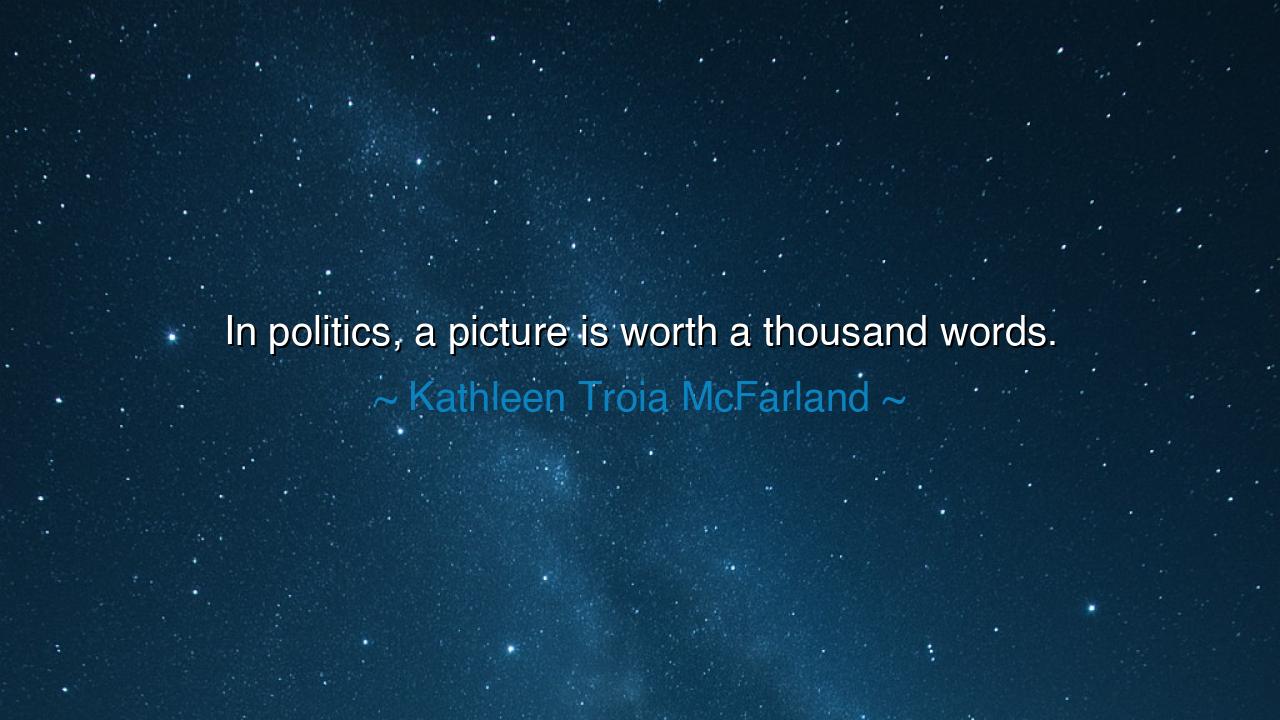
In politics, a picture is worth a thousand words.






The words of Kathleen Troia McFarland — “In politics, a picture is worth a thousand words.” — unveil the immense power of images in shaping the hearts of nations. In the realm of politics, speeches may be forgotten, promises may fade, but a single picture can burn itself into the memory of generations. For an image speaks directly to the soul, bypassing the tangled nets of rhetoric, stirring emotion more swiftly than reason can.
The meaning of this teaching is that in the struggle for power and persuasion, vision triumphs over argument. A leader may speak for hours, yet a single photograph — of triumph or of failure, of compassion or of cruelty — can undo or exalt a lifetime of words. Thus, McFarland warns that those who walk the path of politics must understand this truth: to neglect the power of images is to fight unarmed in a battlefield where perception shapes destiny.
History bears vivid witness. In 1968, during the Vietnam War, the photograph of a young girl, naked and burned by napalm, ran across the world. That picture, more than any speech, stirred outrage and shifted the tide of public opinion. Decades earlier, the image of Winston Churchill standing defiant amid the ruins of the Blitz told Britain and the world that the spirit of resistance would not break. Both moments reveal McFarland’s wisdom: where words are forgotten, the picture remains, carrying truth or illusion far beyond the moment of its creation.
The origin of her statement lies in the modern age, where television and media saturate the political stage. Leaders are no longer remembered solely for their policies, but for the images that define them — Kennedy’s calm presence in the televised debates, Reagan’s warmth with his people, Obama’s poster of “Hope.” In each case, the picture became the message, embedding itself deeper than any argument.
Therefore, O seekers of wisdom, learn this: the battle of politics is not only fought in parliaments or on battlefields, but also in the theater of perception. Guard well the images you create, for they may speak louder than your words, and endure long after your voice is silenced. As McFarland reminds us, a picture is not mere reflection but power itself — a mirror in which a people see their fears, their hopes, and their destiny.






TAThuy Trang a5
This quote brings up an important discussion about the role of imagery in politics. In today's world, a picture has the power to influence public perception almost instantly. But how much can we rely on visual media to understand the complexities of political issues? Are we losing the ability to engage in critical thinking, focusing too much on visual cues and not enough on the substance of policies and ideas?
MPLe Huynh Mai Phuong
It’s intriguing how Kathleen Troia McFarland points out that a picture can be more impactful than words in politics. In an era of social media, this is especially relevant. A viral image can change the course of public opinion overnight. But does this reliance on images mean we're missing the deeper issues at hand? Can we trust political images to always represent the truth, or are they just carefully crafted narratives?
TNT.D. Nghia
McFarland’s statement highlights the importance of visual imagery in modern political communication. Politicians are increasingly aware of how powerful an image can be in shaping perceptions. But does this diminish the value of verbal discourse? Should political leaders rely more on substance over style, or is it a necessary strategy to communicate with a wide audience? How can we find a balance between impactful visuals and meaningful conversation?
AQAnh Quan
This quote makes me reflect on how politics has evolved with the rise of visual media. A well-timed image can shift public opinion in an instant, yet the meaning behind it can be distorted depending on how it’s framed. How much does the power of visual storytelling influence voters' decisions compared to the content of speeches and debates? Are we at risk of focusing more on style than substance?
NKNgoc Khanh
Kathleen Troia McFarland’s quote about the power of images in politics really rings true in today's media-driven world. It's fascinating how a single image can evoke strong emotions or tell a story in ways that words sometimes can’t. But does this reliance on visuals mean we’re oversimplifying complex issues? Can an image ever truly capture the full scope of a political situation, or is it more of a tool for manipulation?